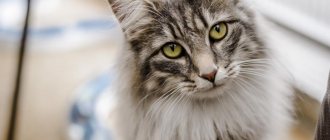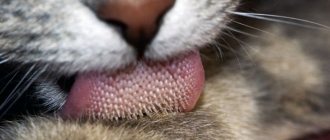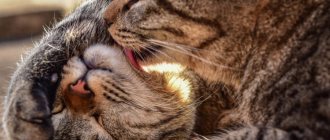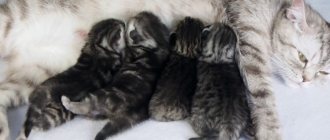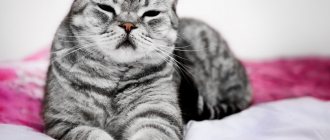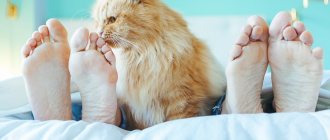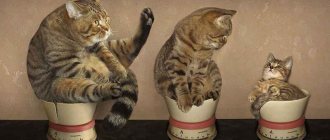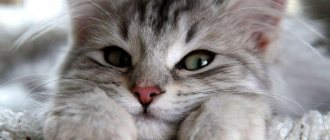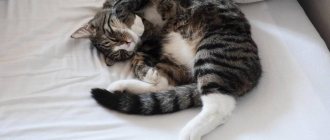Selecting a territory
It is believed that the sweat glands on the paw pads of cats are involved in the process of identifying territory. The chemical composition of secretions in all living organisms, including humans, is unique to each individual. Animals can indeed communicate in this way what belongs to them. This is an instinctive process and it occurs spontaneously: a signal is recorded in the pet’s brain about the need to mark the territory. The favorite is reminded of this by the most ancient mental attitudes.
If a cat tramples a person with its paws, this means that the animal appreciates him and wants the owner to always be with him.
How to stop a cat from biting
Having a cat in the house is like bringing a rainbow into the house and riding on it - furry pets bring so much joy to people. Communicating with the little family pet will be a joy for everyone, but very quickly the tiny miracle will turn out to be a biting and scratching monster.
Bites and scratches from a small kitten do not frighten, but rather amuse, but the older the cat gets, the more problems such wounds can cause. In this case, the fault lies not with the cat, but with its owner, who did not act in time to raise his own pet with due responsibility. to stop a cat from biting - bites and scratches are fraught with infection of open wounds, so condoning this behavior is the same as inviting all the viruses and bacteria directly into the body.
The sooner the educational process begins, the easier it will be to achieve the desired result.
Asks to play with him
Cats know how to entertain themselves and never let their owners get bored. We've all at least once experienced the thrill of a sudden landing of clawed paws from somewhere above or had to save our legs and arms from scratching attacks.
You need to play with cats if you want to create comfortable living conditions for them. Playing brings out their ancient instinct of the hunter, so try to keep your cat occupied more often during the day and evening, so as not to become an “easy prey” at night.
Spend at least 10-15 minutes playing before meals, create the illusion of hunting, train your pet's flexibility and dexterity using toys on strings and throwing balls, then you will have every chance of a restful sleep.
They defend themselves from enemies
How to make your cat's life easier during heat
Evolution has made cats very sensitive and attentive to external circumstances. Even in their sleep, they twitch their ears every now and then, listening to see if the enemy is sneaking away in order to protect themselves in time. By covering their faces with their paws, cats provide their most important organs, their eyes and nose, with safety so that they can survive a sudden attack by the enemy. After all, it is the eyes and nose that help them survive. Even at home, cats try to adhere to these rules.
Studying
The nature of this motive is the same as that described above. Only this time, the main role is played by the fact that cats use their markings as an excellent way to collect information. The animal comes into contact with human odors, determining whether it is dangerous or not.
Scientists believe that when meeting a stranger, a cat compares the smell of the guest with the smell of its owner. This is how the animal’s favor towards other people is determined. But you shouldn’t assume that if a cat suddenly rubs itself against a stranger’s legs, you can immediately pet and caress it. For an animal, this is only the initial stage of collecting information. If a cat likes a person, he will show interest.
How does this happen?
We also advise you to take a closer look at how two cats who sympathize with each other behave. They “knock” their foreheads in the same way, and sometimes even intertwine their tails. At the same time, animals can purr sweetly and make other interesting sounds. When the cat leaves the room, its smell remains in the air for quite some time. So other pussies will quickly realize that the place is occupied or was occupied. Amy Shojai, a specialist whom we often refer to in our publications, regards “butting” as a way to consolidate territorial claims. With the small exception that with “territorial” marks, unique odors are usually applied to inanimate objects. And “butting” the owner is, rather, a great way to say: “You are only mine and no one else’s.”
They've eaten too much and can't move.
Why do cats peel wallpaper and scratch furniture?
Many domestic cats enjoy all the benefits that humans can provide them. For example, they consume delicious food, store-bought or homemade, in maximum quantities and, of course, quickly gain weight. Which makes both cats and their owners very happy - owners of large furry beauties. Having gorged itself on another impressive portion of goodies, the cat, of course, immediately wants to go to bed so that no one interferes with the digestion process. But since these animals are very clean, they must wash themselves before going to bed; this is inherent in them by nature itself. While washing his face half asleep, the furry one may inadvertently fall asleep halfway, leaving his paw on his face.
The light bothers them
Although cats sometimes sleep 20 hours a day, they still prefer to do it in the dark so that nothing disturbs them. Thus, by covering their muzzle with their paw, they provide themselves with the desired level of lighting, which is as comfortable as possible for them. Unfortunately, cat sleep masks have not yet been invented, so pets have to make do with available means of protection from bright sunlight. However, they don’t mind, and neither do their owners, because cats sleeping this way are so charming.
Instinctive preparation of a place to rest
Before the domestication process began, cats made their own places to sleep. Often, in order to lie down comfortably, one had to crush the bristling grass with one’s paws. It was also important to make sure the bed was safe for future relaxation.
Cats are by nature cautious and selective - the predatory instincts of wild animals are alive in them and are not reduced. By pressing his owner's paws, the cat checks whether his body is safe enough to relax and fall asleep. With this action, cats may not purr, silently preparing a place for themselves to rest.
Uncomfortable “weather in the house”
The cat is a nocturnal predator. At night, she is busy hunting. During the day it’s time for her to get some sleep.
The bright light of the sun or the lighting in the room prevents her from completely falling asleep. She tries to protect her peace by covering her eyes with her paw.
If the room is cold, the cat curls up into a ball and covers its nose with its paw, reducing the surface area of its body's heat transfer. In this way the animal tries to warm up. She tries to find a cozy place on the bed, in a chair, in a box or on the sofa.
Why does my cat spank me with its paw?
By nature, felines are prone to overstimulation. This may be the reason why your cat is hitting you with its paws. At the same time, your pet still requires more of your attention and care.
If you pet your kitten when he hits you, it may mean that your pet wants you to stop. At the same time, your kitten may want to say that he doesn't like your petting.
However, if you are already familiar with your kitten and know how to pet him, you may be wondering why he is suddenly hitting you. In such cases, your pet may get injured or something similar.
If you think there is something wrong with your pet, it is best to contact your veterinarian for advice.
Interesting facts about cats
Why do cats spend so much time licking their fur? For cats, licking, in addition to being a means of hygiene, is a way to maintain mental balance. Grooming calms and neutralizes incipient aggressiveness. By licking, the cat licks from the fur a certain amount of a substance containing vitamin B, which is necessary to regulate mental balance. If you deprive a cat of this opportunity, he will become nervous and may even die.
Why does a cat sometimes try to lick your face or hair? The first impression a kitten receives from its mother is care in the form of licking and washing. For him, this is an act of care and concern, so if the cat (or cat) tries to lick you, take it as an attempt to take care of you in a motherly way.
Why do cats sometimes lick and bite woolen clothes, balls, scarves? There are several theories, but scientists generally believe that the reason is the same as in the previous question.
Why are some people allergic to cat hair? Strictly speaking, the allergy is not caused by fur, but by the FEL D1 protein contained in cat saliva. When a cat washes itself and licks itself, it transfers saliva to its fur, after which it can end up on furniture and carpets. Different individuals have different amounts of protein secreted, but in general, cats are less allergenic than cats. There are two ways to prevent such an allergy - bathe the cat, rinsing the substances from the fur (which is not recommended to do often), or wipe the cat's fur with a special soft cloth.
Why does a cat, lying in your arms, move its paws, “beating” something? The reason again lies in childhood. A kitten feeding on mother's milk, massaging the cat's belly with its paws, stimulates the “supply” of milk. An adult animal uses this technique to show extreme comfort and satisfaction.
Why do cats usually go into the arms or lay on the legs of those who don’t like them? When one cat tries to scare another, it arches its back, raises its fur, and lets out a menacing hiss. If a person does not like cats, he tries to sit quietly so as not to attract the attention of the animal. And the cat considers this a sign of favor. Doesn't hiss, doesn't move - that means he's a friend.
Why does a cat try to hit its head on a person? It turns out that this is a way of expressing affection, and they can express this behavior in relation to other members of their tribe, not just people.
Why do cats scratch furniture and wallpaper? It is generally accepted that this is how cats sharpen their claws. But even if you offer your cat a convenient nail sharpener, he will still be happy to sharpen his claws on the corner of the wall or sofa (in your absence). This happens, among other things, because on the cat’s paws, between the toes, there are special glands with which the cat marks its territory.
Why do cats rub against furniture, table legs, legs? Cats have special glands on the tail, on the sides of the head, on the lips, on the tongue, near the genitals and between the front legs. They use them to mark their territory. When a cat rubs against your leg, he is marking you, indicating that you are “his.” For the same reason, cats rub against furniture and corners of rooms.
Why immediately after you pet your cat does he begin to lick himself? There are two theories, according to one, the cat is trying to get rid of your smell, according to the second, on the contrary, he tastes it with his tongue in order to “continue the pleasure.”
Why can a cat, if petted for a long time, suddenly scratch or bite? If a person accidentally touches sensitive areas for a cat - ears, nose, tail, the cat may make a sound that “enough is enough!”, but if the person does not stop, then the cat may bite or scratch. He just gets tired of affection.
Why does a cat, when passing another cat, slow down and move slowly? All cats are territorial animals. They distribute territory among themselves depending on the level of the internal hierarchy. Any encroachment leads to open conflict. Therefore, if a cat just wants to pass by, it tries to slow down and not look at the owner of the adjacent territory at all.
Why does a cat, when burying the “results” of its life activity, dig outside the box and not inside? This is due to the innate tendency of cats to cleanliness. The cat tries not to get his paws dirty. To do this, clean the cat litter area more often.
Why does a cat sometimes scratch the floor or “bury” a bowl of food? This can happen for two reasons - either the cat is trying to bury food “in reserve”, or by such an action it shows that he does not like the food.
Why do cats bite and lunge? Kitten games always include sitting in ambush, surprise attacks and throws. Therefore, cats at any age love such children's games. Draw their attention to laces with a bow, balloons and more.
Why do cats lightly bite your skin and hold you for a few seconds? Some cats, when they feel great, pinch a fold of human skin between their teeth and hold it for a short time. This is a kind of cat kiss.
Why does a cat turn his back to you if you don’t pay attention to him for a long time or leave? Cats, like other animals, recognize visual signals from your body, and in the case when you do not show obvious signs of aggression or calmly move away from its field of view, the cat loses interest in you and turns away.
Why do cats bring you dead mice? There are at least 4 theories: 1. The cat gives you a gift as a sign of his friendship or because you feed him. 2. The cat considers you a mediocre hunter, and is trying to teach you to hunt. 3. The cat takes the victim to a safe, warm place, where it can later eat it. 4. The cat is trying to save you from hunger in his own way.
Why does a cat play with a half-dead mouse? Cats are attracted to movement and if the prey continues to show signs of life and moves, the cat attacks, playing, again and again, until it ceases to be interested in it.
Why does a cat crouch when he sees a bird? When a cat catches prey, it squats several times. These movements indicate that the cat is about to attack. Another point of view is a gesture of dissatisfaction. When a cat hunts a bird in nature, it is quiet and unnoticeable. If the prey is unattainable, the cat makes such false movements. It’s something like “well, what is this?!” in people.
Why does a cat's jaw sometimes tremble and its teeth chatter when it sees its prey? This only happens if production is unattainable.
Why do cats often “hide” their toys in a bowl of food or water? Cats consider the territory in which they feed to be theirs. Therefore, they try to move all their toys to a place that is safe from their point of view, to their territory. Often this ends up being their bowl.
Why don't cats like to swim? In fact, most cats are comfortable with water and will fish if possible. But when a cat is held tightly by hand and dipped into a bowl of water, from his point of view this does not look very much like voluntary fishing, which causes legitimate indignation.
Why do cats love to drink water dripping from the tap? Cats, like other animals, prefer fresh food and water. From their point of view, running water looks fresher, so water coming out of a tap is more attractive to them than water sitting in a bowl. For the same reason, cats love to drink from large containers (my cat likes to drink exclusively from a bucket, and is very reluctant to drink from a bowl).
Why do cats lick photographs and plastic bags? In this way, cats “taste” a smell that humans do not notice, but animals can clearly distinguish.
Why do some cats love valerian and others not? Scientists say it's a matter of a special gene. Some cats love to roll on valerian leaves, licking themselves, some quickly eat it, some are absolutely indifferent. Another possible reason is that the smell of valerian is similar to the smell of a cat during certain periods.
Why does a cat “wince” when it smells something particularly interesting? Cats smell 14 times more powerfully than humans! In addition to the nose, cats can detect odors using the so-called Jacobson tube, located on the upper palate behind the front incisors. The cat uses it when she is completely focused on some particularly interesting smell, sucking in air, slightly raising her upper lip and nose.
Why does a cat wag its tail? Cats wag their tails when faced with a choice, with one desire blocking another. For example, if a cat is standing in a doorway and wants to go out, and it is raining outside, the tail will swing due to internal conflict. The cat wants to go out, but doesn't want to get wet. As soon as she makes a decision (stay at home or go out into the rain), the tail will immediately stop swinging. If a cat is near you and its tail is shaking, this is the greatest feeling of love that it can express. When the tail begins to droop, it means the mood has changed - you can move away, she won’t be offended.
Why do cats often “interject” into conversations on the phone? When a cat hears that you are talking to someone and does not see the other person, he believes that you are talking to him, so he begins to answer you. The more you talk to cats, the more they talk to you.
Why do cats purr? Cats make purring sounds for many reasons. Many experts believe that cats purr when experiencing intense emotion (pleasure or pain). Cats use more than a hundred different sounds when communicating, surpassing dogs, chimpanzees and gorilla in this.
Why doesn’t a cat like to eat from a bowl, but drags food onto the floor? Most cats do not like food to come into close contact with dishes. In addition, in a narrow container, some of the food may be inaccessible to the tongue. That’s why cats love to eat from a wide, low container, or even better, from the floor.
Why don't cats like sweets? It turns out that it's all about a defective taste receptor gene. Cats simply do not know what sweet is; they cannot taste it. Molecular analysis shows that big cats also have this defective gene, and it is likely that it helped shape the development of their carnivorous behavior.
Why don't cats hurt themselves when they fall even from great heights? Having studied the circumstances of many successful animal falls, scientists have found that cats are helped by the so-called “parachute effect”: their legs lengthen and their bodies expand, reducing the speed of their fall. At a minimum height, cats use, first of all, the elasticity of their paws. Another explanation: when falling from a great height, a cat presses its paws and tail to its body and flies, spinning - thereby slowing down its fall. And before landing he straightens his paws.
Why does a cat shake its paws? To show disgust for something, a cat raises its paws and shakes them. This may be due to the instinctive action of shaking off water, which is unpleasant for most cats.
Why do cats hide when they are sick? Instinct tells the cat that when he is weak, he is easy prey for a predator, so during periods of illness, cats try to hide from possible dangers.
Facts about cat vision. Cats need 1/6th the amount of light needed by humans to see. In the dark, a cat's eye even uses light reflected from the retina. Cats, unlike dogs, cannot focus their gaze on nearby objects, that is, cats are farsighted, and dogs are nearsighted. Cats can see up to 60 meters away. Their peripheral vision is approximately 285 degrees. In fact, a cat sees best at a distance of 75 cm to 2-6 meters. If the pupils are dilated despite bright lighting, the cat is very interested in something or is in a playful mood. Cats have round, slanted and almond-shaped eyes. A kitten's eye color may change as it ages.
Facts about cat hearing. Cats perceive sound frequencies in the range from 50 to 60 kHz. The dog reacts to a sound with a frequency of about 40 kHz. A person is able to detect sounds with a frequency of 20 kHz. A cat's sensitivity to sound volume is 3 times higher than that of a human. The cat's ear rotates 180 degrees. A cat has 32 muscles in each ear, and they use twelve or more muscles to control the ear.
Facts about cat whiskers (vibrissae). Vibrissae (lat. vibrissae, from vibro - oscillate, wriggle), large, protruding above the surface of the coat, sensitive (tactile) hair in mammals. A cat has an average of 12 movable whiskers on each side of its face. At the base of the whiskers there is a large number of nerve endings, so the cat uses them to receive information about everything that surrounds it - about objects, about wind, about temperature, etc. If a cat's whiskers are removed, it may have poor spatial orientation, for example, difficulty hunting and generally feel insecure. The whiskers help the cat determine whether it will fit through the hole. If a cat's whiskers point forward, it is very interested in something. Or in skirmishes he wants to scare his opponent. If the whiskers point back, the cat is scared and avoids touching. When the cat is calm, the whiskers are directed to the sides.
How old is your cat by human standards? If your cat is 3 years old, that is equivalent to a human being 21 years old. If 8 years, then in human terms - 40. If 14, then 70 human years. The average lifespan of a domestic cat is 15 years, while for wild cats it is from 3 to 5 years.
Do not pick up a kitten or cat by the scruff of the neck. Only cats can do this without harm, and only with their kittens.
Cats understand tone of voice. When talking to cats, be mindful of your tone of voice. Cats understand when you are angry with them (even though they may not show it).
Never feed your cat dog food. The protein requirement of cats is 5 times greater than that of dogs.
Remembers his mother
The big question is whether grown-up kittens and adult cats remember their mother. But it has been scientifically proven that the desire of a cat to stomp on your face is associated with childhood and with pleasant memories of being fed with mother's milk.
“Milk step” is a term used by veterinarians to define the behavior of a kitten when receiving food from a nursing cat. Kittens alternately press their front paws on the mother's belly, thereby stimulating milk production. The childish reflex remains in cats for the rest of their lives - it is a special form of calming, affection, showing love and trust in their owner.
Cats hugging toys
Other images that, for example, show cats hugging a toy can also be misinterpreted.
Typically what they do is grab a toy with their front paws and scoop it up with their back legs in a "bunny" style, something that cats instinctively do either when playing or when they are involved in a fight with another cat.
They do this to cause as much damage as possible to their opponent, which you will know if the cat mistakes your hand for their opponent!
Why does a cat bite? Read here!!!
In the closet
How can you not love dark cabinets? Cats love this area because there are at least two strong walls for safety and plenty of soft fabric to nestle in. Another benefit of a closet is that the enclosed space blocks out most of the sound coming from the rest of the house, so your kitty can sleep in there all day long. A closet makes a great hiding place for your pet when you have a party at home or when she's hiding from you because it's time to trim her nails or take a bath. Just be ready. It can be quite frightening when, as you are about to change your shoes, you suddenly see a pair of eyes peering out of the darkness.

